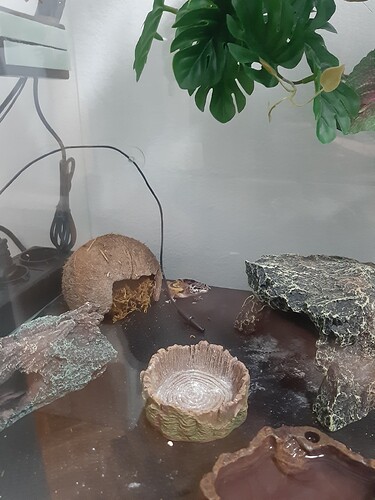Hello everyone,
I got a new baby gecko 2 weeks ago. It’s my first time keeping a reptile.
Three days after he got here including that day he ate normally (2-3 insects), preffered mealworms but ate dubia roaches also.
After that he stopped eating but then shed after 5 days (from the day he got here).
But now he continues not to really eat, and when I give him insects with tongs he turns his head away.
His poop was also unusual. I think he threw up once? Also, when he pooped the day after I saw an undigested dubia roach. After, his poop was white and watery. Today it was like a little rock?
He always has fresh water, his temp is 29°C on the warm side, (I also tried 33°C but it didn’t help with his appetite). He has a moist hide and other hides too. The insects are gut loaded, but they may be a bit big? Although he wouldn’t eat the smaller ones as well. I clean his tank every day.
Do you think he is just stressed out or has parasites or a disease?
1 Like
Can you post a couple pictures of you gecko from the top and side? Just to see the body condition.
It sounds like you may be stressing this little guy out. Give him a couple of days without cleaning so he can figure things out. He’ll most likely figure out where he wants to poop and that will make things easier later on.
Was he tong feeding previously? If he’s not used to eating on tongs it can stress them out as well. I honestly haven’t tong fed in a long while, but even when I did I usually did just a few mealworms in the dish and kept count of them so I can see if they eat. You may need to change to a smooth sided dish for a bit so the mealies can’t climb out.
3 Likes
I’ve bred and sold a couple hundred leos, and the two most common causes of not feeding for new owners are improper temp gradient, and housing in a bare glass cage. Leos (and other reptiles) that are not used to glass enclosures can stress out in them. Best by far to find out how the breeder was housing the gecko and imitate that as closely as possible until the gecko is settled in.
If there’s just a heat mat for heat, possibly the gecko isn’t able to get its body temp up – just surface heat won’t do it unless it is in a tub in a rack (which holds heat). Some substrate helps a little with temp gradient issues, too – it holds heat for a minute, and the gecko can thermoregulate a bit better than if he’s just sitting on hot glass (it can also be misted a little if needed – ‘hard rock’ might suggest that the gecko’s getting dehydrated, which is not unusual since most people keep them too dry). A temp gun can take the temp of the gecko’s body, and that may be a more useful measurement, or at least another measurement that can be used for comparison.
After those things are addressed, it is a rare leo that won’t take crickets.
Long term consideration that’s unrelated to your current concern: “gutloading” is rarely a workable solution to supplementation (especially if you mean feeding the insects fruits and vegetables, which doesn’t raise calcium or D3 levels at all and so simply is not gutloading). Easier and more effective to dust every prey item with a good all in one supplement such as Repashy Calcium Plus. I can provide documentation of these claims with references to published studies if you like.
2 Likes
